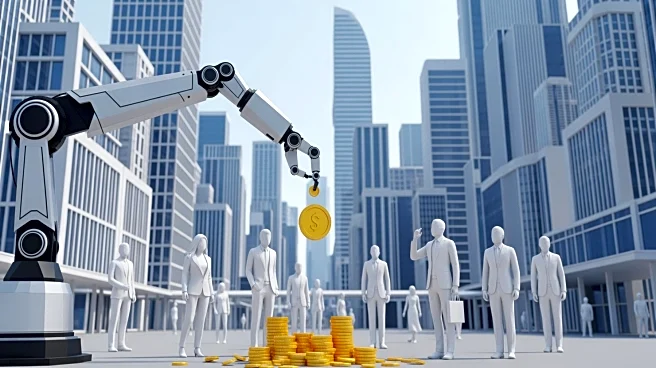What's Happening?
Universal Basic Income (UBI) is gaining attention as a potential solution to the affordability crisis in the United States. Various pilot programs across the country are testing the impact of regular,
unconditional cash payments to citizens. The concept, which has historical roots in the advocacy of Dr. Martin Luther King Jr., is being revisited due to the increasing cost of living and the potential job displacement caused by artificial intelligence. Michael Tubbs, former mayor of Stockton, California, implemented a UBI program in his city, providing $500 monthly payments to residents in low-income areas. The program aimed to address poverty directly, rather than just its symptoms. Research from the Stockton initiative showed positive outcomes, including reduced income volatility and improved mental health among participants.
Why It's Important?
The exploration of UBI is significant as it addresses the growing economic challenges faced by many Americans. With AI potentially displacing jobs, UBI could provide a safety net, offering financial stability and reducing poverty. The Stockton program demonstrated that UBI can lead to better financial management and improved family dynamics, suggesting broader societal benefits. Advocates argue that UBI could replace parts of the existing welfare system, ensuring that people are not left behind during economic shifts. The concept has gained support from figures like Andrew Yang and tech leaders, indicating a growing interest in systemic economic reform.
What's Next?
As UBI gains traction, further research and pilot programs are likely to continue, assessing its feasibility as a national policy. Discussions may focus on integrating UBI with existing welfare systems and addressing potential funding challenges. The impact of AI on employment will be a critical factor in these discussions, as policymakers consider how to mitigate job losses. The success of UBI programs could influence future legislative efforts, potentially leading to broader implementation across the country.
Beyond the Headlines
The ethical implications of UBI include considerations of economic equality and the role of government in ensuring citizens' welfare. Long-term shifts could include changes in societal attitudes towards work and income, as well as the potential for increased civic engagement and social cohesion. The success of UBI could redefine the relationship between citizens and the state, emphasizing proactive measures to combat poverty.










